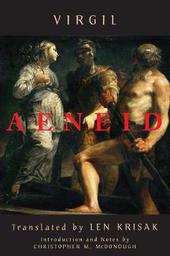
|
The Aeneid
Paperback / softback
Main Details
Description
Rising to the challenge of rendering the poem's Latin hexameters by adopting English iambic ones, Len Krisak's Aeneid doubles down on the English poetic tradition by also featuring rhyme. In Krisak's hands, these devices provide not only a superb kind of music but the snap and power of an epic adventure that glories in what only formal poetry can do. Enhanced by an Introduction and an extensive set of notes by Christopher M. McDonough, this Aeneid works as story, voice, and verse. 'Len Krisak not only boldly meets Virgil line-for-line, but in a hexameter that answers the original meter, all while hewing to straightforward English with a weather eye on the Latin.' - A.E. Stallings
Author Biography
Len Krisak has translated Horace's Odes (2006), Virgil's Eclogues (2010) Ovid's Erotic Poems (2014), and Prudentius' Crown of Martyrs (2019). Among other honors, he is the recipient of the Robert Penn Warren Prize, the Richard Wilbur Award, and the Robert Frost Prize. Christopher M. McDonough is Alderson-Tillinghast Chair in the Humanities, Sewanee: The University of the South.
Reviews"Virgil's Aeneid , though central to the Western canon, is also one of the most difficult to tackle for the translator, with its knotty syntax, its famously 'pious' protagonist, and its slippery ambivalence toward questions of truth and power. In this fresh translation, Len Krisak not only boldly meets Virgil line-for-line, but in a hexameter that answers the original meter, all while hewing to straightforward English with a weather eye on the Latin . The six-beat line has a reputation in English for dragging, but Krisak's hexameters drive along briskly. His choice to rhyme throughout, sometimes chiming ingeniously and sometimes with subtler off-rhyme effects, brings home that we are reading not only an epic narrative, but a verse performance. This work, concerned with human displacement in the aftermath of a prolonged war, with its themes of personal responsibility, duty, and leadership, and imbued with anxiety about the direction of a nation, could not be more topical." A. E. Stallings "Len Krisak's translation of the Aeneid is smooth, speedy, musical, and clear. Sometimes witty, always ingenious, Krisak's rhymes manage to feel effortless ; together with meter, they move the story briskly along. Virgil's variety is here: dark vision, but also vividness and pace . The Aeneid is a narrative that is also a great poem; Krisak's rendering, accurate line for line and also packed with lush imagery, constantly reminds us of these twin facts." Rachel Hadas, Board of Governors Professor of English, Rutgers University-Newark "Yes, another English Aeneid . . . but one that merits its place in the great tradition of translations of the untranslatable. There are passages where Krisak seems to hit on exactly the right word or turn of phrase that has eluded so many readers and translators of Virgil's epic before him. This is a splendid book, which surely deserves to be the choice for classes reading the Aeneid in English, or for those who wish to become better acquainted with the premier poet of Augustan Rome ." Lee Fratantuono, Professor of Classics, Ohio Wesleyan University "Len Krisak's rhymed English hexameter couplets will allow readers to experience the Aeneid as its first Roman audience did: here is an exciting story told in an unprecedented way ." Charles Martin "[G]lowing admiration for the overall achievement of this translation. Krisak has been translating Latin (and German) verse into English verse for some time and has won prizes for doing so. His 2000 collection Even as we Speak has a title that identifies the quality which explains the success of this volume under review: ancient Latin epic is turned into the sort of language which all speakers of current English can understand, can enjoy and can admire. Good writers make it look and sound easy: very good translators make their work sound as if it had been written in English in the first place. Krisak does all this and more. "The book has a brisk and enthusiastic introduction by Christopher M. McDonough, setting the poem in its context and giving us hints of the back-story and the reception of this text. At the end of the book there is a good set of notes (also by McDonough), picking up names and issues which readers new to the poem will need help to understand and also pointing out intertextual resonances in the poem." John Godwin, in Bryn Mawr Classical Review "Readers with some experience of the Aeneid in Latin will enjoy the intelligence, imagination and ingenuity that Krisak has brought to his task. [Readers without such experience] can also entrust themselves to Krisak's version with confidence, and they should enjoy it. . . . Krisak's verse is vigorous and lucid; the reader is carried forward easily." Richard Jenkyns, emeritus Professor of the Classical Tradition and the Public Orator at the University of Oxford, in Classics for All "In the Preface, Krisak states that he aims to offer readers the sense that they are 'reading a true poem in English.' No doubts should remain about the success of that enterprise. Krisak's Aeneid distinguishes itself by being the work of a poet, a classicist, and an experienced translator of Latin poetry. . . . The verse translation achieves no small measure of rhythm and melodiousness. . . This translation of the Aeneid does 'taste' like poetry and is of the highest quality. "McDonough's contribution to the volume with his Introduction and notes is commendable. The brief Introduction contextualizes Aeneas' myth while emphasizing the poem's pivotal relationship with Homer's epics. . . . The notes are a valuable tool for readers approaching the epic for the first time." A. Loio, in The Classical Review
|